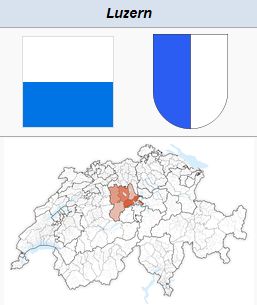Difference between revisions of "Lucerne (Switzerland)"
| [unchecked revision] | [checked revision] |
GameoAdmin (talk | contribs) (CSV import - 20130820) |
GameoAdmin (talk | contribs) (CSV import - 20130823) |
||
| Line 1: | Line 1: | ||
| − | [[File:LucerneCanton.jpg|300px|thumb|right|''Canton of Lucerne | + | [[File:LucerneCanton.jpg|300px|thumb|right|''Canton of Lucerne |
| − | Source: [http://en.wikipedia.org/wiki/File:Karte_Lage_Kanton_Luzern_2009.png Wikipedia Commons] | + | Source: [http://en.wikipedia.org/wiki/File:Karte_Lage_Kanton_Luzern_2009.png Wikipedia Commons]'']] Lucerne, is a canton in [[Switzerland|Switzerland]] (pop. 223,409 in 1955; pop. 350,600 in 2001), predominantly [[Roman Catholic Church|Catholic]]. The Reformation found no entry here. Lucerne headed the Catholic cantons and in the religious wars it led the Catholic party. |
| − | |||
| − | '']] Lucerne, is a canton in [[Switzerland|Switzerland]] (pop. 223,409 in 1955; pop. 350,600 in 2001), predominantly [[Roman Catholic Church|Catholic]]. The Reformation found no entry here. Lucerne headed the Catholic cantons and in the religious wars it led the Catholic party. | ||
The Lucerne Council took severest measures to suppress the [[Anabaptism|Anabaptist]] movement. In 1525, the year of the birth of the brotherhood, [[Krüsi, Johannes (d. 1525)|Johann Krüsi]] died at the stake at Lucerne as the second blood witness of the [[Swiss Brethren|Swiss Brethren]], [[Bolt Eberli (d. 1525)|Eberli Bolt]] having been executed a few months previously in Schwyz. [[Lober, Julius (16th century)|Julius Lober]] in his list mentions two martyrdoms in Lucerne in 1531 by drowning (Beck, 311). Orderly court procedures in religious matters were excluded in Lucerne; a decision of the Catholic cantons of 10 June 1532 decreed that Anabaptists in their territory, if they did not desist from their false doctrine, were without ado to be put to death (Strickler, 589). How many Swiss Brethren became victims of this decree is not known. At the Lucerne Assembly of the Catholic cantons it was decided on 30 April 1560 to take steps against the Swiss Brethren at [[Appenzell (Switzerland)|Appenzell]], and the meeting in [[Baden (Canton Aargau, Switzerland)|Baden]] in 1567 confirmed the resolutions of 1532 (Bergmann, 42). | The Lucerne Council took severest measures to suppress the [[Anabaptism|Anabaptist]] movement. In 1525, the year of the birth of the brotherhood, [[Krüsi, Johannes (d. 1525)|Johann Krüsi]] died at the stake at Lucerne as the second blood witness of the [[Swiss Brethren|Swiss Brethren]], [[Bolt Eberli (d. 1525)|Eberli Bolt]] having been executed a few months previously in Schwyz. [[Lober, Julius (16th century)|Julius Lober]] in his list mentions two martyrdoms in Lucerne in 1531 by drowning (Beck, 311). Orderly court procedures in religious matters were excluded in Lucerne; a decision of the Catholic cantons of 10 June 1532 decreed that Anabaptists in their territory, if they did not desist from their false doctrine, were without ado to be put to death (Strickler, 589). How many Swiss Brethren became victims of this decree is not known. At the Lucerne Assembly of the Catholic cantons it was decided on 30 April 1560 to take steps against the Swiss Brethren at [[Appenzell (Switzerland)|Appenzell]], and the meeting in [[Baden (Canton Aargau, Switzerland)|Baden]] in 1567 confirmed the resolutions of 1532 (Bergmann, 42). | ||
Revision as of 14:08, 23 August 2013

Lucerne, is a canton in Switzerland (pop. 223,409 in 1955; pop. 350,600 in 2001), predominantly Catholic. The Reformation found no entry here. Lucerne headed the Catholic cantons and in the religious wars it led the Catholic party.
The Lucerne Council took severest measures to suppress the Anabaptist movement. In 1525, the year of the birth of the brotherhood, Johann Krüsi died at the stake at Lucerne as the second blood witness of the Swiss Brethren, Eberli Bolt having been executed a few months previously in Schwyz. Julius Lober in his list mentions two martyrdoms in Lucerne in 1531 by drowning (Beck, 311). Orderly court procedures in religious matters were excluded in Lucerne; a decision of the Catholic cantons of 10 June 1532 decreed that Anabaptists in their territory, if they did not desist from their false doctrine, were without ado to be put to death (Strickler, 589). How many Swiss Brethren became victims of this decree is not known. At the Lucerne Assembly of the Catholic cantons it was decided on 30 April 1560 to take steps against the Swiss Brethren at Appenzell, and the meeting in Baden in 1567 confirmed the resolutions of 1532 (Bergmann, 42).
Bibliography
Beck, Josef. Die Geschichts-Bücher der Wiedertäufer in Oesterreich-Ungarn. Vienna, 1883; reprinted Nieuwkoop: De Graaf, 1967.
Bergmann, Kornelius. Die Täuferbewegung im Kanton Zürich bis 1660. Leipzig: Heinsius, 1916.
Hege, Christian and Christian Neff. Mennonitisches Lexikon, 4 vols. Frankfurt & Weierhof: Hege; Karlsruhe; Schneider, 1913-1967: v. II, 709.
Strickler, Joh. Actensammlung zur Schweizerischen Reformationsgeschichte in den Jahren 1521-1532 Zurich, 1881: IV
| Author(s) | Christian Hege |
|---|---|
| Date Published | 1957 |
Cite This Article
MLA style
Hege, Christian. "Lucerne (Switzerland)." Global Anabaptist Mennonite Encyclopedia Online. 1957. Web. 24 Nov 2024. https://gameo.org/index.php?title=Lucerne_(Switzerland)&oldid=92486.
APA style
Hege, Christian. (1957). Lucerne (Switzerland). Global Anabaptist Mennonite Encyclopedia Online. Retrieved 24 November 2024, from https://gameo.org/index.php?title=Lucerne_(Switzerland)&oldid=92486.
Adapted by permission of Herald Press, Harrisonburg, Virginia, from Mennonite Encyclopedia, Vol. 3, p. 412. All rights reserved.
©1996-2024 by the Global Anabaptist Mennonite Encyclopedia Online. All rights reserved.
